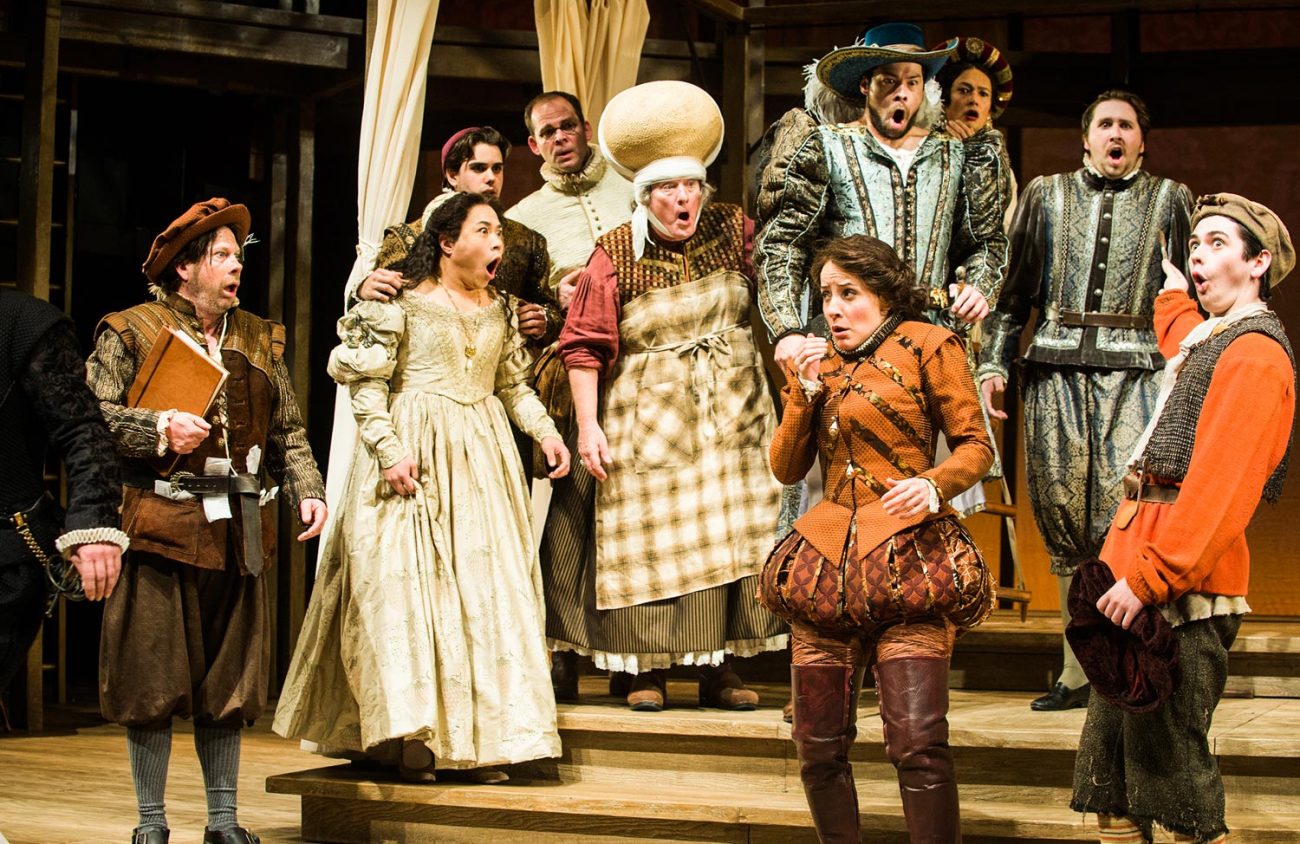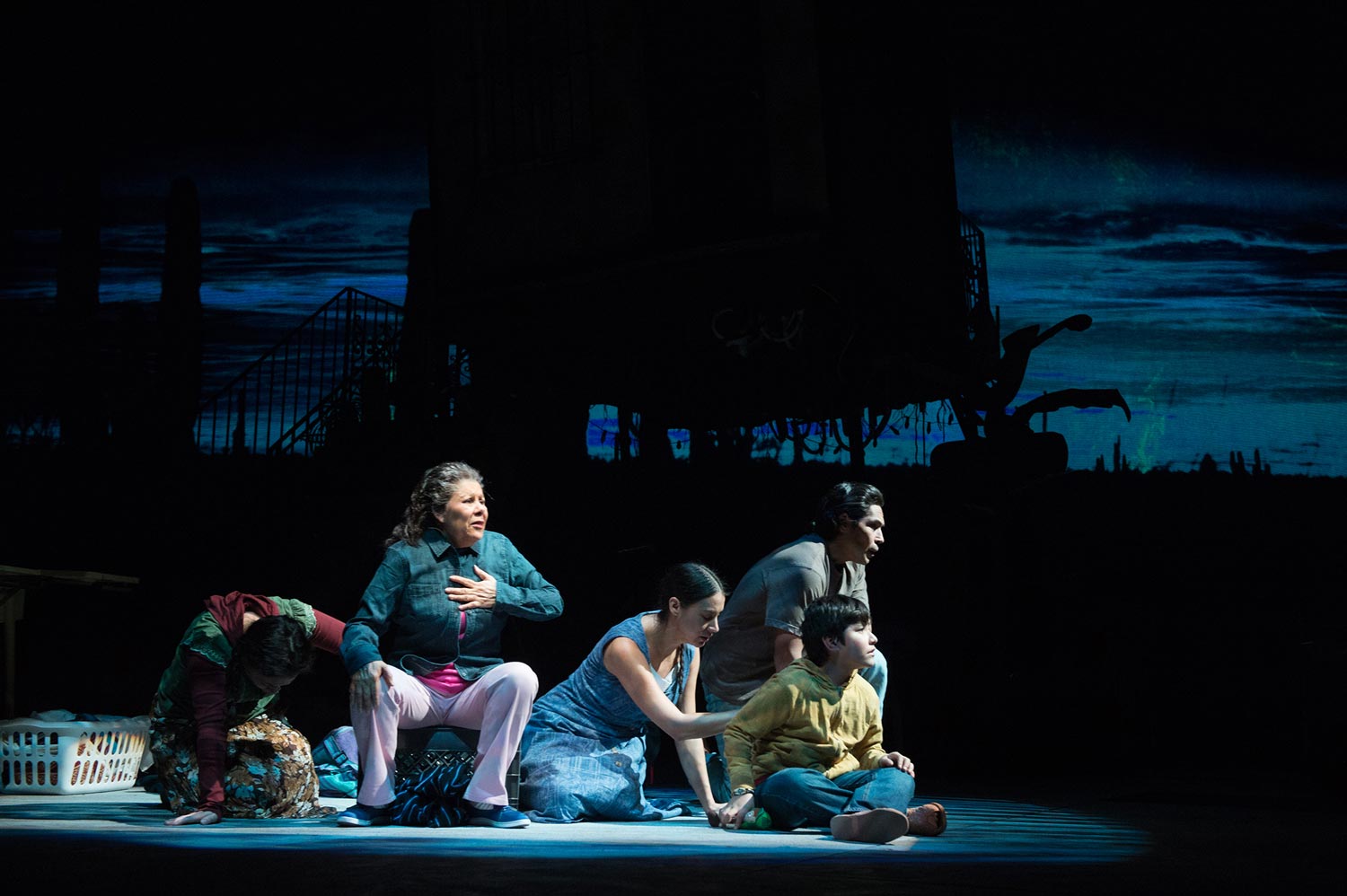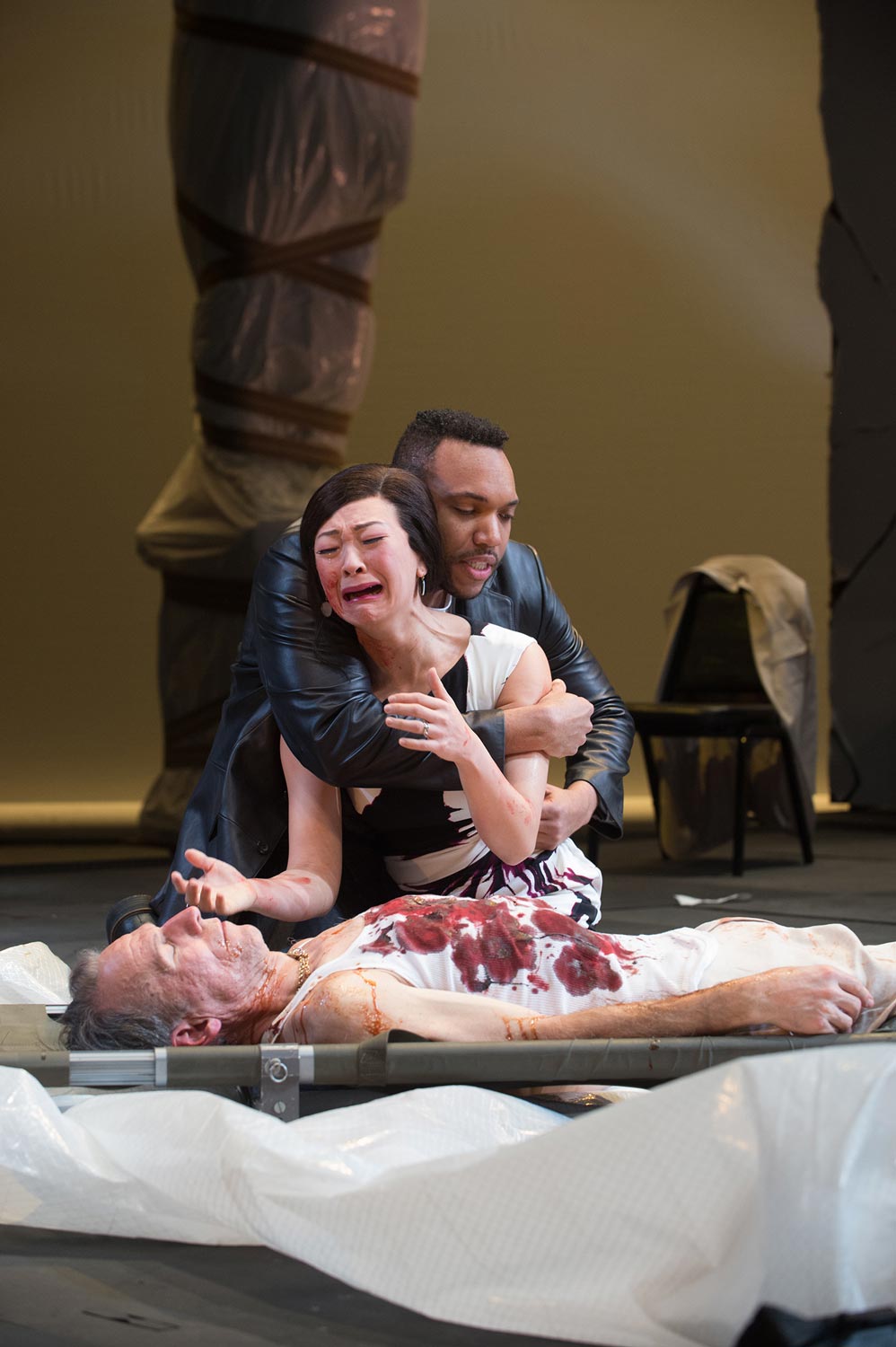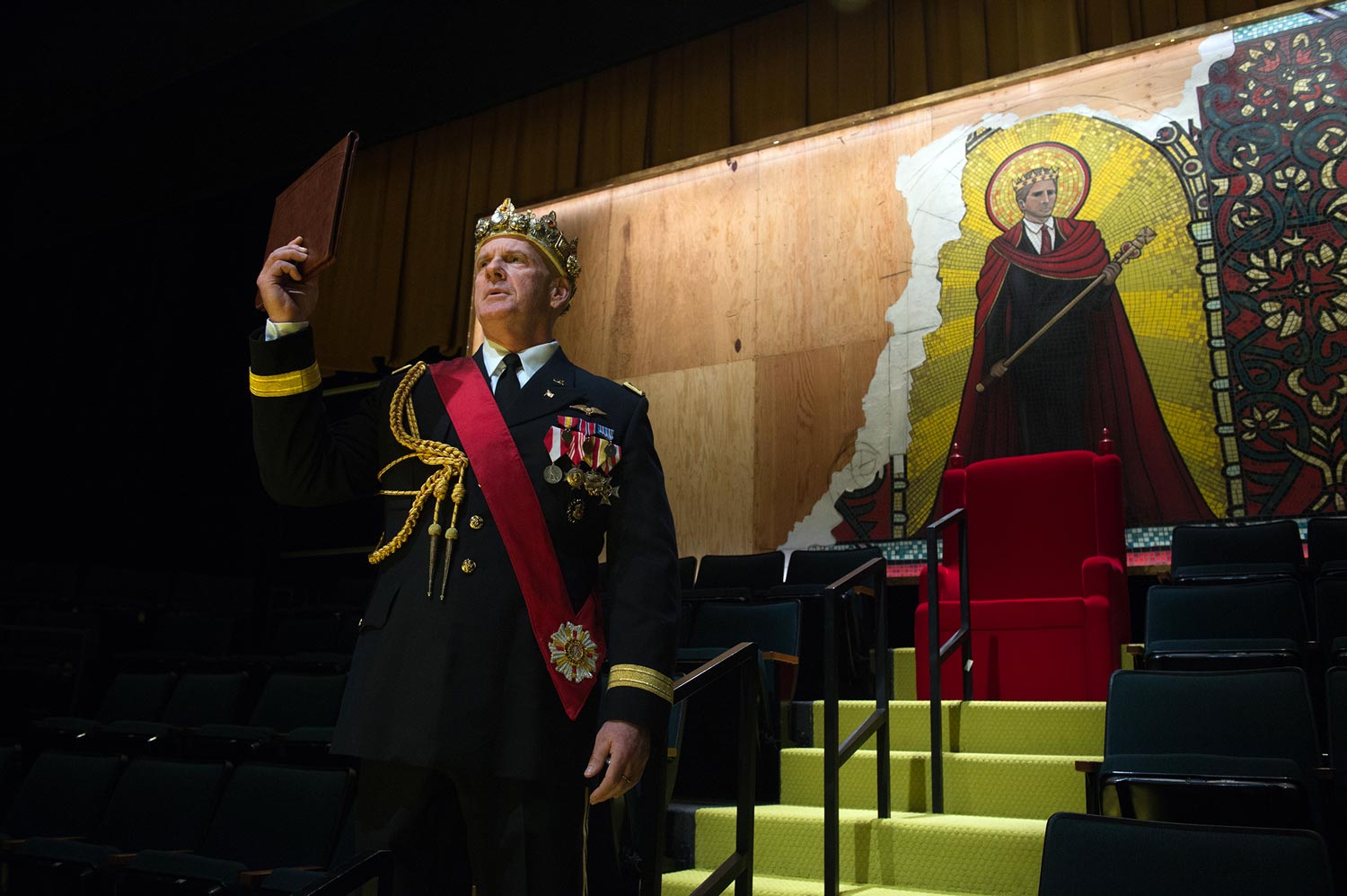It’s Bill Rauch’s tenth season as artistic director at the Oregon Shakespeare Festival in Ashland, and on Saturday morning of opening weekend last month he sat on stage with OSF actor Rex Young and answered questions before a delighted crowd.
Example: Did the Tony-winning All the Way make a lot of money for the festival when it jumped from OSF to Broadway? Well, Rauch said, not nearly as much as Hamilton, calling the blockbuster show, which was not from OSF, “the OSF musical that got away.”
So what should he and the festival be doing to address these trying political times?
Rauch didn’t hesitate.
“I am exactly where I need to be,” he said. “And we are doing exactly what we need to do.”
He ticked off all the Shakespeare festival has been doing under his leadership: A hugely broadened diversity in casting and in play selection. A focus on new plays. A focus on American history, particularly the history of under-represented groups. A focus on musicals. And, of course, a continued focus on Shakespeare.
The best way to look at what Rauch and his players are up to is to enjoy the plays. Here’s a quick look at the four shows — two by Shakespeare — that opened in late February.
Shakespeare in Love
In the Angus Bowmer Theatre through Oct. 29
Yes, you’ve seen the movie. With a screenplay co-written by Tom Stoppard, the mad genius behind such stage nuggets as Arcadia and Rosencrantz and Guildenstern are Dead, the movie version of this fanciful tale, which came out in 1998 with Gwyneth Paltrow and Joseph Fiennes in the lead roles, took seven Academy Awards, including Best Picture.
So why go see it again?
Because it’s so much more fun to watch a play about theater on a real stage. And because OSF is offering the U.S. premiere of this stage version, which was 16 years in the making. It’s been previously produced in London’s West End (2014) and at the Stratford Festival in Canada (2016).
The story is simple, sweet, hilarious and, should you make the mistake of taking it for actual history, wildly inaccurate. Young playwright Will Shakespeare (William DeMeritt) suffers writer’s block while working on his new comedy, tentatively titled Romeo and Ethel, the Pirate’s Daughter, which he is trying to purvey to Henslowe (Brent Hinkley), an entrepreneur who holds that all successful shows must be comedies featuring a pirate and a dog.
(And, yes, there’s a dog in this show. A real live dog. Cue the audience: “Awwwwwww …”)
Along the way Will meets a young actor named Thomas Kent, who does an unusually good onstage turn as Ethel, men being required to play women in the theater in those Elizabethan days. It turns out, of course, that Kent is so good at portraying a woman because he really is a woman, though not in any 21st-century transgender sense. “He” is Viola de Lesseps, a wealthy young woman who wants to be an actor and who is, unfortunately, betrothed by family obligation to the older and more boring Lord Wessex.
Sound Shakespearean yet?
This is two and a half hours of sheer razzle-dazzle, fast dialogue and accessible fun fitted out in faux Elizabethan English. And, as with the movie, a thoroughly engaging love story underlies all the action, both of the intellectual (spot that fleeting Shakespeare reference!) and slapstick variety.
Christopher Liam Moore directs a cast that is essentially an ensemble, with almost every actor taking on multiple roles. DeMerritt is solid as Will, the struggling playwright; Jamie Ann Romero is sweet as his eventual Juliet. The wonderful K.T. Vogt (remember her from last year’s country-western Yeomen of the Guard) is splendid as Viola’s loyal nurse.
Rachel Hauck’s set is straightforward and reminiscent of Shakespeare’s Globe Theater.
My bet is that this will be the sell-out play of the season. Get tickets early if you plan to go.
Mojada: A Medea in Los Angeles
In the Angus Bowmer Theatre through July 6
As the lights come up on Luis Alfaro’s moving little play Mojada, Jason and Medea — pay heed to those mythical names — are living in a tiny stucco house in Boyle Heights, a Mexican-American neighborhood of Los Angeles. A severe agoraphobe, she’s a stay-at-home mom raising their son, Acan, and slaving seven days a week at her sewing machine to help make ends meet. Medea’s world, once clearly expansive, now ends at the garden fence.
Jason — it’s pronounced Hah-SOHN in this part of town — has a good job working for Armida, a local developer, also from Mexico, who is on her way to creating a real estate empire by housing all those immigrants who keep arriving in L.A. Jason is pulled each day out into the larger world by money and work and Armida’s flashy, hard-edged charms.
Overseeing the young couple’s increasingly estranged life is Tita, the elderly indigenous healer who has taken care of Medea since she was a girl in Mexico. In this echo of a Greek tragedy, Tita serves as a wry chorus to the simultaneously unreeling stories of brutal violence that overtook Jason and Medea as they trekked north to the United States, and of its horrifying aftermath in the collapse of their relationship.
Mojada — you can translate the word as “wetback” — surprised me in ways I’m still trying to figure out. It’s no mystery that things are going to end badly for any couple named Jason and Medea (especially for any of their children). But the route by which Alfaro takes us to that bloody ending is as rich — in character, story and irony — as the delicious mole Tita serves up for dinner.
Juliette Carrillo, who did 2014’s The Sign in Sidney Brustein’s Window at the festival, directs this production simply and well. Acting is excellent across the board. Sabina Zuniga Varela gives us a sweetly shy Medea, whose reticence masks the stomach-turning violence she quietly endured while crossing the border. Lakin Valdez is affable as Jason, who becomes trapped in his relationship with Armida, played to platform-heeled perfection by OSF veteran Vilma Silva.
The young Acan is played charmingly by Jahnangel Jiminez, a fifth-grader at nearby Talent Elementary School.
And VIVIS — that’s how the program credits the actor more generally known as Vivis Colombetti, who has film credits from Patch Adams and Paranormal Activity 2 to Ouija, besides her theater work — is quietly spectacular as the dryly mystical and sardonic Tita, a role not far removed from a wise Shakespearean fool.
The story is played out on a simple, effective set by Christopher Acebo, who also did costume design. Dominating the stage is Jason and Medea’s little house, which stands up all a-kilter, like a tree about to fall.
Mojada runs for just an hour and a half, with no intermission. With a bit of racy sex and intense descriptions of off-stage violence, the play may not be suitable for younger children.
Julius Caesar
In the Angus Bowmer Theatre through Oct. 29
With the Trump presidency hovering over America like a storm cloud, what better time could there be for a new production of Julius Caesar? The new president has been widely, if not always accurately, compared to the Roman consul, who was assassinated by a conspiracy of other Roman leaders in 44 B.C., leading to the collapse of the republic and the rise of the emperors.
Shakespeare’s flawed play — the main character dies half-way through, causing a big shift in dramatic pace — about Caesar kicked off this year’s festival on Friday night of opening weekend to a nearly full house in the Angus Bowmer Theatre. Directed by Shana Cooper, it went for obvious effects, sometimes substituting muscular dance routines for the subtleties of the text, but saw good performances nevertheless from a nicely understated Armando Durán as Caesar and from Danforth Comins and Rodney Gardiner as Brutus and Cassius respectively.
The real star of this uneven show, though, is the remarkable set by Sibyl Wickersheimer. A guest artist at the festival for four years, she is known for making amazing worlds from prosaic materials. Her set for Julius Caesar looks like it grew out of a shopping spree at Home Depot, with walls of broken corrugated cardboard panels accented by a few fluorescent shop lights and acres of seamless white paper.
As the play opens, Caesar and his family inhabit a fractured cardboard world that looks like the inside of a shipping carton badly mishandled by UPS. The aging despot is increasingly vain; his insecurity has begun to strip the Roman republic of civil liberties and civility itself.
Into this political chasm step Cassius and Brutus, who hatch the plot to kill Caesar on the Ides of March and save Rome.
Julius Caesar has given us endless familiar lines, from “Et tu, Brute?” uttered by the dying Caesar to his treasonous friend Brutus, to “I come to bury Caesar, not to praise him,” delivered with wonderful irony by Marc Antony, played here with great conviction by Jordan Barbour.
Caesar’s death, of course, solves nothing, and only serves, as Antony says, to “let slip the dogs of war.” The most striking character in this show is the mob, made monstrous by gray masks, that forms and ebbs and flows after the assassination: a lesson, perhaps, for our own times.
In the end, though, the show fails to satisfy, largely due to those incessant melodramatic dance routines by choreographer Paul James Prendergast. There’s only so much warlike drumming and chest thumping an audience can take on stage these days when there’s so much already happening in the real world.
Henry IV, Part 1
In the Thomas Theatre through Oct. 28
Before any of you Shakespeare novices tune out this play on account of its slightly tedious title, you need to know it was Henry that brought us, among other things, the marvelous character of Falstaff.
Fat, farting, drunk, vain, cowardly and oozing insincerity, Falstaff is a pillar of human frailty served up in a charmingly overweight package.
In Lileana Blain-Cruz’s tight new production of Henry, OSF veteran G. Valmont Thomas portrays Sir John Falstaff as a pink-suited denizen of Mistress Quickly’s cocaine-infused disco world, complete with flashing strobes and black lights.
Thomas, who’s been at OSF for 13 seasons, is a marvel to watch in one of the most popular roles in all Shakespeare. Flashing the whites of his eyes for emphasis, his Falstaff whines and minces his way through one comic catastrophe after another — stealing money, losing it, and hilariously describing his own heroism against a horde of imaginary attackers whose number increases with each telling.
Oh, all right, there’s more to this play than the excellent comic relief. The story is about the coming of age of the young prince Hal — played here by a perfectly insouciant Daniel José Molina — who has been squandering his life in the inebriated company of Falstaff and his merry band, as events are about to demand he grow up to become a king.
In the best scene in the play, Molina’s Hal and Thomas’ Falstaff rehearse Hal’s pending confrontation with his father, Henry IV. At first Falstaff plays the king and dutifully chides young Hal for his immature behavior. But then Hal insists they swap roles, meaning Hal now plays the king and Falstaff, Hal, leading to the kind of nuanced through-the-looking-glass reversal that makes Shakespeare Shakespeare.
Adam Rigg’s abstract set is spectacularly odd, with the cast performing amid a series of steel pipes that rise up from the floor of the Thomas. It works well, providing a firm skeleton to hold the disparate parts of this story together. Well done.
Seven more plays are coming up at the festival this season.
My two picks among them, sight unseen:
The Odyssey opens June 6 and runs through Oct. 14 in the outdoor Allen Elizabethan Theatre. It’s directed by Mary Zimmerman, whose amazing The White Snake in 2012 was the best show I’ve seen there. She also did Guys and Dolls at OSF in 2015 and directed Dvořák’s opera Rusalka to great acclaim this season at the Metropolitan Opera in New York.
Off the Rails, which opens July 27 and runs through the season in the Angus Bowmer Theatre, is making its world premiere in Ashland, directed by Bill Rauch. An adaptation of Shakespeare’s Measure for Measure set in Buffalo Bill’s Wild West show, it’s the first play staged at the festival by a Native American playwright, Randy Reinholz.
The other five upcoming plays are: In the Angus Bowmer Theatre, August Wilson’s poetry in UniSon, April 19 – Oct. 28. In the Thomas Theatre, Hannah and the Dread Gazebo, March 29 – Oct. 28; and Henry IV, Part 2, July 4 – Oct. 29. In the Allen Elizabethan Theatre, The Merry Wives of Windsor, June 6 – Oct. 13; and Disney’s Beauty and the Beast, June 8 – Oct. 15.
Going to Shakespeare for the first time?
Here are a few tips for getting the most out of your visit to the Oregon Shakespeare Festival
What is it?
The festival, founded in 1935, is one of the largest repertory theaters in the United States. A repertory theater is one that puts on more than one show during the same time period, meaning you can see several different plays during a typical weekend visit.
During its season, which runs from mid February through the end of October, OSF stages 11 plays at its three theaters in downtown Ashland, though most don’t run for the entire season.
Isn’t Shakespeare kind of dead-white-European boring?
Particularly under Bill Rauch, OSF’s artistic director since 2008, OSF has been known for contemporary programming with an emphasis on cultural diversity. Even before Rauch, OSF had instituted race-blind casting. These days the festival offers a yeasty collision of traditional Western canon plays — now including American musicals — alongside stories from Asia, Africa and Latin America.
More than half of the festival’s shows are not by Shakespeare. Ten years ago, OSF embarked on an ambitious project, American Revolutions, to commission 37 new plays (the number written by Shakespeare) about American history from leading playwrights. Seven have been staged so far. Robert Schenkkan’s All the Way, which premiered at OSF as part of American Revolutions in 2012, went on to Broadway two years later and won the Tony Award for Best Play.
Do I have to sit outside?
Only if you attend a play at the festival’s outdoor 1,190-seat Allen Elizabethan Theatre. It doesn’t open until the beginning of June. The two indoor venues are the Angus Bowmer Theatre, which seats 600 in front of a conventional stage, and the black-box Thomas Theatre, which can be configured in various ways to seat between 270 and 360.
What else do I need to know?
Buy tickets and make hotel reservations early. Some shows at the festival have sold out their entire run before opening night. Get tickets online at OSFAshland.org. This year’s big sellers so far are Shakespeare in Love, Hannah and the Dread Gazebo and Disney’s Beauty and the Beast.
Don’t be late. Plays at OSF start on time to the minute, and latecomers aren’t seated. Parking in downtown Ashland can be challenging, especially during the summer season, so give yourself plenty of time.
Enjoy the festival’s many educational opportunities, from ticketed noon talks to free outdoor programs. The morning back-stage tours (tickets $20, $14 for ages 6-17), conducted by company members, are especially fascinating.



